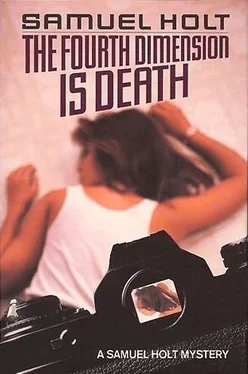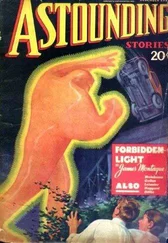“I knew him,” I said. “Not very much.”
“A fine actor,” he told me. “Great deal of promise. Cut down like that.” He shook his head again. “We never know, Ed,” he said. “We never know when it all stops.”
“That’s true, I guess,” I said, and cleared my throat, and said, “Julie said there was this part, uh, with Rita Colby?”
Henry flipped at once from deep sadness to quiet pride. “A fine actress,” he told me. “I’m honored to represent her.” And he gestured at her photo, among those on the wall.
I looked at it, across the room. Rita Colby was one of those people who, by either nature or design, are very easy to caricature. Her short full auburn hair was worn in a helmet style, curling down around her earlobes. Her dark eyes were very large, always just a little surprised looking, and her mouth had a very individual quirky wrinkle to it, so that when she smiled just a little she looked as though she’d just heard a really terrific dirty joke, and when she frowned just a little she looked honestly and hopelessly heartbroken. It was a wonderful acting tool, that face, and she had the technique and talent to go with it.
Looking at that blown-up black-and-white picture, with its lavish inscription scrawled in white ink, I became aware for the first time that Rita Colby was just about the only famous face on these walls who was still alive. All the rest of those people had joined the late-greats. Was Rita Colby Henry’s only living major client?
Had those other people ever been Kay Henry clients at all?
While I was looking at the pictures, thinking about them, Henry had been looking at me, thinking about me, and now he said, thoughtfully, “You know, Ed, Julie may have something there. You do look a bit like Dale, in fact. Different color hair, of course, and the moustache, but you’re tall, and you have the same kind of well-defined bony face. As a matter of fact...” And he gazed past me, following some new thought.
I looked at him. Could he possibly be doing what I thought he was doing? “Mr. Henry?” I said.
He looked back at me, grinned, and shook his head. “Nothing,” he said. “I’m pretty sure they’ll be dropping that campaign anyway.”
So it was true! He’d been thinking of offering me the job of parodying Packard, replacing Wormley in those commercials. This whole situation was getting too convoluted. I said, “But you think Julie may be right about me and that play?”
“It’s a possibility,” he told me. “Tell you what, Ed. Are you free about four this afternoon?”
“Oh, sure,” I said, very eager.
“Rita Colby has cast approval,” he explained. “She approved Dale, and she’ll have to approve the replacement. She’s dropping by this afternoon—”
“Here? She’s coming here?”
He smiled at my eagerness. “Yes, she is,” he said. “Why don’t you come back then, about four o’clock, and I’ll introduce you.”
“That’d be great, Mr. Henry,” I said, and now I did stand up, not as though in a hurry to leave but as though I’d become too excited to remain seated. “I’ll be here at exactly four o’clock,” I said.
Getting to his feet, Henry laughed lightly and said, “Just remember, we do sometimes run a little late.”
“That’s okay,” I said. “I’ll be here.”
“That’s good, Ed. I think you have the right attitude. Whatever problems you had in the past, I just have a hunch they’re finished. Things are looking up.”
“Yes, they are!”
“See you at four, then,” he said, raising a graceful hand to usher me out.
Hesitating, I said, “Would it be a good idea for me to take a look at the script? To get some idea of the part, you know.”
“Let’s just let Rita have a look at you first,” he told me, patting my arm gently, looking up at me with sympathetic friendliness. “Okay, Ed?”
“You know best,” I told him, and he laughed and said, “Well, I guess I’m supposed to, eh? That’s my job.”
I thanked him again, we shook hands, and I went back out to the receptionist’s area. Having pressed the elevator button, I turned grinning to the cold Miss Colinville and said, “I’ll tell you something, beautiful. I’m walking on air.”
“That’s nice,” she said, without interest, and turned to answer the phone.
Brett and Blair Knox and I had lunch at one of the new trendy places in the west Twenties. Now that office rents in midtown have driven the book publishers south, restaurants have bloomed there as well, since apparently book publishing is a trade that can’t exist without lunch. We’d wanted to eat somewhere respectable, but we didn’t want to run into anyone we knew — particularly not Kay Henry. So the west Twenties it was.
Blair Knox began as an actress, sort of an Alexis Smith type, thirty-some years ago. She didn’t have much success on stage, but she got interested in the agenting side of the business, went to work for one of the big outfits, and a few years later branched out on her own. Her client list has never included any major stars — no Rita Colbys — but she has a reputation for handling solid and reliable performers, and for being solid and reliable herself. Her clients find her a sympathetic and supportive force in their lives, her attitude probably coming from her early efforts to be an actress herself; she’s been on their side of the street.
In photos from that time, she’s a slender, straight-backed, regal-looking person, a little too aloof to be loved by an audience. Now, in her mid-fifties, a rigorous dieter and exerciser, she was more compact than slender, the regal appearance having hardened to a look of brisk efficiency. Slipping on tiny silver-framed reading glasses to study first the menu and second the list I’d given her, she looked somehow like the dean of a small private college. The list was the resumé I’d given Kay Henry; if he were to phone Blair, she should have some idea of Ed Dante’s career. Scanning it, shaking her head, “Well,” she said, “I don’t seem to have done much for you .”
“I was a drinker,” I explained. “Not always reliable. I’ve told you I’m on the wagon now, and you hope I mean it.”
She grinned at me, removing the little specs. “But I wouldn’t touch you with a barge pole, is that it?”
“Just about.”
“Fine,” she said, and put list and specs away in her purse.
We ordered, then talked generally for a while, ate our main courses, and over coffee it was Brett who returned us to the subject of the day, saying to Blair, “Tell us about Kay Henry.”
Giving him an arch look, she said, “Thinking of making a change, are you, Brett?”
Now, Brett’s a nice guy, and smart, but you can’t joke with him. Looking flustered, he said, “That isn’t what I meant. It’s Sam that—”
“Ed,” I reminded him, and Blair smiled and patted his hand on the table, saying, “I know, dear, I was just teasing.”
Then Brett felt stupid. “Of course you were,” he said. “Sorry.”
“About Kay Henry,” Blair said, and looked at me. “What do you want to know?”
“Well, reputation, I guess,” I told her. “But something more. In his office, there’s all these signed photos of stars, but I noticed, Rita Colby’s the only one of them who isn’t dead.”
Blair was delighted at this. “Is that true? Has he really done that? Sam — Ed, I mean — that’s wonderful.”
“It’s all a phony, then? Those other people were never his clients?”
“Never,” she agreed.
“But he’s a legitimate agent, isn’t he? He isn’t a con man or anything.”
“No, no,” she said. “He’s real, all right. He probably has somewhere between forty and sixty clients now, mostly kids starting out, a few older character actors and like that. There’ve been a few clients who hit big, but they always leave.”
Читать дальше












